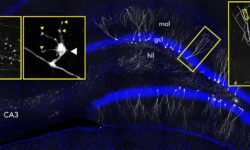Category Archives: memory
New data on neurogenesis, pattern separation, context discrimination and stress
One of the leading hypothesized functions for adult hippocampal neurogenesis in memory is pattern separation. Loosely defined, pattern separation is the process of making similar patterns of neural activity more distinct. This is clearly relevant for learning and memory since we have many experiences that are similar to each other…
Forming and recalling memories. Artificially.
Memory manipulation has become one of the most hotly pursued topics in neuroscience. After all, much or of who are is based on what we’ve learned, including memories that we can consciously recall as well as acquired desires and habits that can lead to problems like addiction. In rodents, we’ve known…
Saving the best for last: neurogenesis, plasticity and memory. #SFN11
Previously, I wrote about new SFN data on the role for newborn neurons in regulating emotion. The second half of the SFN meeting rounded out the story because the bulk of the functional presentations focussed on the role of new neurons in that other, classic function of the hippocampus: memory.…
Random roundup
“Random” roundup because any posts linking to articles or ideas I’ve recently found noteworthy will never occur on a regular basis (as others manage to do – I applaud you) but only when enough interesting material has accrued and I have a spare moment. The links will, however, not be…
How does the brain pick which neurons to use?
Wiring. That’s one answer to this question. We know this from topographic maps in the thalamus and neocortex, where the basic units of sensory information are neatly represented in spatially-arranged populations of neurons – the various body parts are represented in specific locations, as are the different frequencies of sound, the different…
Pattern separation: 370,000,000 papers 2050?
If you’ve been paying attention to the adult hippocampal neurogenesis literature at all, you noticed that “pattern separation” is gaining popularity as a research topic. A few quick searches on Pubmed confirm that a trend is indeed afoot. For the years prior to 1999, only 15 Pubmed-indexed papers answer to…
Someone finally dissects the role new neurons play in fear conditioning
Based on a true story – how progress is made in the field of adult neurogenesis* A group of scientists reduce neurogenesis and report a memory deficit. A second group repeats the experiment, with only a few minor differences in protocol, and fails to find a memory deficit. A third…
Do new neurons go through a critical period and then retire, never to be used again?
And here we have the latest, craziest hypothesis of granule cell function. Crazy not because the authors have lost their minds but because the story of the dentate gyrus, where adult neurogenesis occurs, is becoming more peculiar every day. The underlying premise of this paper by Alme et al. (which we…
What IS the dentate gyrus doing to CA3?
A fundamental property of the hippocampus is its ability to rapidly encode memories while simultaneously keeping them distinct. Recording from hippocampal neurons one can clearly see that different populations of neurons are active as a rat explores two environments. This is thought to be one mechanism by which information is…
